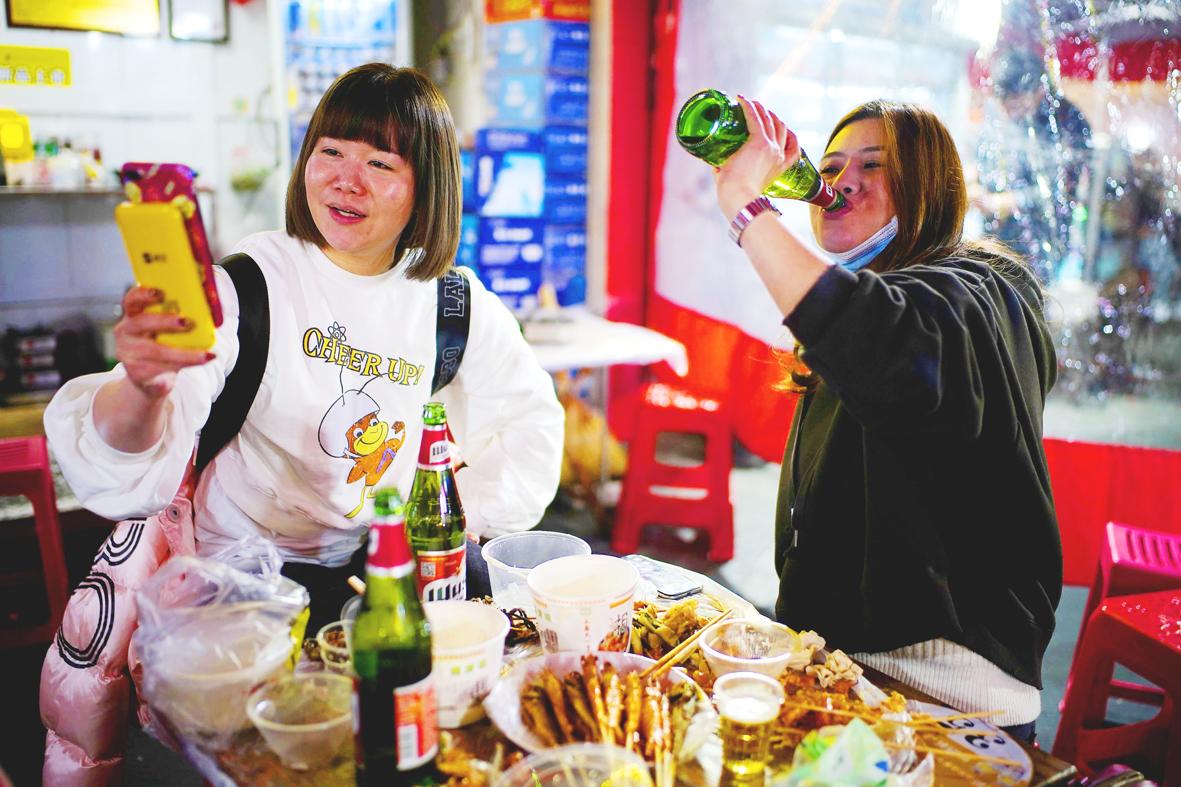French President Emmanuel Macron tested positive for COVID-19, his office said in statement yesterday.
Macron was tested after showing mild symptoms of the disease, and would isolate for seven days and continue to work, the statement said.
An official at the Elysee Palace declined to provide details on the circumstances of the infection or where the president would be isolating.

Photo: Reuters
The diagnosis comes at a particularly sensitive time for Macron. France is struggling to tame the pandemic, with the president fielding unrelenting criticism of his handling of the crisis and the economic fallout.
Macron is the third leader of a G7 nation to contract COVID-19, after US President Donald Trump and British Prime Minister Boris Johnson.
Also yesterday, the WHO told a news conference that Beijing would welcome an international team of COVID-19 investigators led by the global health organization that is scheduled to visit China next month.
China has strongly opposed calls for an international inquiry into the origins of COVID-19, saying that such calls are anti-China, but has been open to a WHO-led investigation.
“The WHO continues to contact China, and to discuss the international team and the places they visit,” said Babatunde Olowokure, the WHO’s regional emergencies director in the Western Pacific. “Our understanding at this time is that China is welcoming the international team and their visit... This is anticipated, as far as we are aware, to happen in early January.”
A team of 12 to 15 international experts is preparing to go to Wuhan to examine evidence, including human and animal samples collected by Chinese researchers.
Thea Fischer, a Danish member, said the team would leave “just after New Year’s” for a six-week mission, including a two-week quarantine upon arrival.
A similar, but not identical virus was identified in a horseshoe bat, indicating that it was transmitted first to an animal, or intermediate host, before infecting humans, Keith Hamilton, an expert at the World Organization for Animal Health who is to take part, told reporters on Tuesday.
“When we are doing animal surveillance, it’s difficult. It’s rather like looking for a needle in a haystack,” he said.
Some Western countries have voiced concern at the delay in sending international experts.
One senior Western diplomat complained of a lack of transparency while experts were not on the ground talking to clinicians and researchers or inspecting lab samples.
However, another Western diplomat said that the mission was on a “good footing” and that the WHO had to accept China’s terms to secure access.
Additional reporting by Reuters

PREPAREDNESS: Given the difficulty of importing ammunition during wartime, the Ministry of National Defense said it would prioritize ‘coproduction’ partnerships A newly formed unit of the Marine Corps tasked with land-based security operations has recently replaced its aging, domestically produced rifles with more advanced, US-made M4A1 rifles, a source said yesterday. The unnamed source familiar with the matter said the First Security Battalion of the Marine Corps’ Air Defense and Base Guard Group has replaced its older T65K2 rifles, which have been in service since the late 1980s, with the newly received M4A1s. The source did not say exactly when the upgrade took place or how many M4A1s were issued to the battalion. The confirmation came after Chinese-language media reported

The Taiwanese passport ranked 33rd in a global listing of passports by convenience this month, rising three places from last month’s ranking, but matching its position in January last year. The Henley Passport Index, an international ranking of passports by the number of designations its holder can travel to without a visa, showed that the Taiwan passport enables holders to travel to 139 countries and territories without a visa. Singapore’s passport was ranked the most powerful with visa-free access to 192 destinations out of 227, according to the index published on Tuesday by UK-based migration investment consultancy firm Henley and Partners. Japan’s and

A Ministry of Foreign Affairs official yesterday said that a delegation that visited China for an APEC meeting did not receive any kind of treatment that downgraded Taiwan’s sovereignty. Department of International Organizations Director-General Jonathan Sun (孫儉元) said that he and a group of ministry officials visited Shenzhen, China, to attend the APEC Informal Senior Officials’ Meeting last month. The trip went “smoothly and safely” for all Taiwanese delegates, as the Chinese side arranged the trip in accordance with long-standing practices, Sun said at the ministry’s weekly briefing. The Taiwanese group did not encounter any political suppression, he said. Sun made the remarks when

BROAD AGREEMENT: The two are nearing a trade deal to reduce Taiwan’s tariff to 15% and a commitment for TSMC to build five more fabs, a ‘New York Times’ report said Taiwan and the US have reached a broad consensus on a trade deal, the Executive Yuan’s Office of Trade Negotiations said yesterday, after a report said that Washington is set to reduce Taiwan’s tariff rate to 15 percent. The New York Times on Monday reported that the two nations are nearing a trade deal to reduce Taiwan’s tariff rate to 15 percent and commit Taiwan Semiconductor Manufacturing Co (TSMC, 台積電) to building at least five more facilities in the US. “The agreement, which has been under negotiation for months, is being legally scrubbed and could be announced this month,” the paper said,